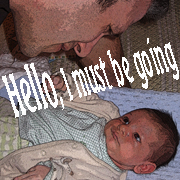 The basis of “Hello, I Must Be Going,†debuting in the Fringe NYC 2011, is the common and eternal theme of life and death. What’s unusual is the way it is explored – through children who were not yet born, an old man who is at the verge of passing to a “better world†and someone who died, but comes back to see a person she was separated from. This variety makes the play wonderful in a way, yet way too complicated on the other.
The basis of “Hello, I Must Be Going,†debuting in the Fringe NYC 2011, is the common and eternal theme of life and death. What’s unusual is the way it is explored – through children who were not yet born, an old man who is at the verge of passing to a “better world†and someone who died, but comes back to see a person she was separated from. This variety makes the play wonderful in a way, yet way too complicated on the other.
In this case, though, it seems to be working well.
The story is about Harvey, a man in his 50s, who is about to become a father for the first time. Harvey is very excited to have children, but his happiness is mixed with sadness, as his own dad, Maury, has just had a stroke and may never see his grandchildren. While the son speaks, the father makes sounds that are unrecognizable; his speech is blurred, which was affected by the stroke. There is so much to be said; however, so little is put into words.
Harvey’s wife, Emma, understands her father-in-law’s defected speech better than her husband does. It is surprising that when Harvey notices that his father’s eyes are light blue (he thought they were brown), Emma says she has always known that. This scene makes us wonder why at times we pay so little attention to the people we are closest to, not truly enjoying their company, losing the precious moments we will later remember with a sigh and a tear.
As far as memories go, there are plenty that take place in the play. Fishing trips Maury and Harvey used to go on; Harvey’s grandfather, who was in the hospital without movement like Maury is now; conversations about Harvey’s girlfriends whom he never considered marrying; the story about how he met Emma. There are so many episodes in the past that are important for us. We always go back to them in order to regret something we did not do, and sometimes just to enjoy them once again.
Colorful and vivid, our memories can cause both joy and pain. Ready to become a mother of twins, Emma reads to her children while they are still in her belly. They communicate with each other and with their mother as well, by kicking her from inside. Out of the two, only Julie is going to make it into the world. The thoughts of the child she might have had tortures Emma all the time. For a mother who was carrying a baby inside her for nine months, losing this little piece of herself is many times more difficult than for a father, as we watch Harvey playing with his son, not worried about his daughter, whom he lost.
Showing these complicated circumstances, the actors play the characters well.
Harvey is shown as an indecisive man, who loves but misinterprets his family, starting with Maury (a usual story, in which parents and children live in different worlds), including Emma, who grieves for her unborn daughter and ending with Julie, whom Harvey scares, not realizing it until Emma points it out to him.
As Harvey’s opposite, his wife is very apprehending and motherly. She shines with confidence and feminine softness. She seems to be a good wife for Harvey, but where he is always worried, she is satisfied with what she has. Emma is more vulnerable to grief, though, and she takes longer to let it go.
Out of all the characters, the greatest connection shown in the play is the one between the twins, Julie and Maggie. They keep talking to each other in their mother’s belly, and even though they are very different, they seem to understand each other better than any other two characters. For them, the parting is even more difficult, as they were together for such a long time. This will be the memory Julie will always cherish.
Overall, with all its sophisticated plot complications, the play is worth watching. There is always something about life and death you have never thought of. Why not discover something new?

Leave a Reply